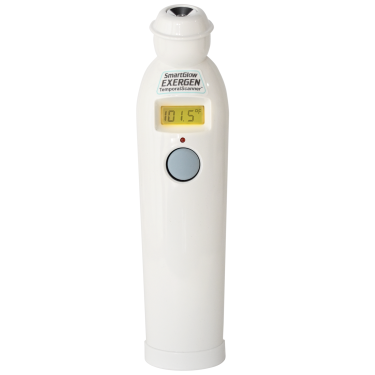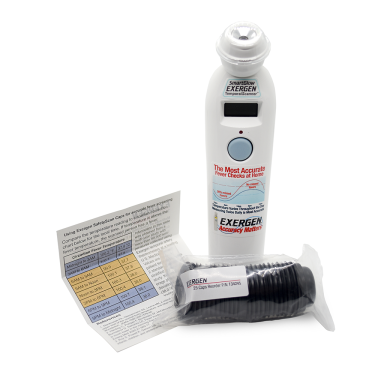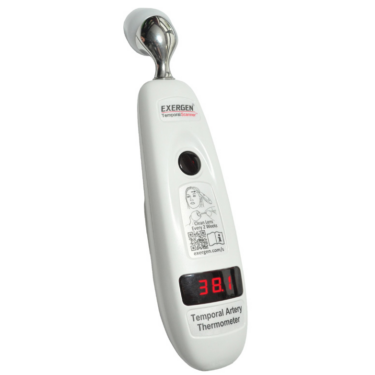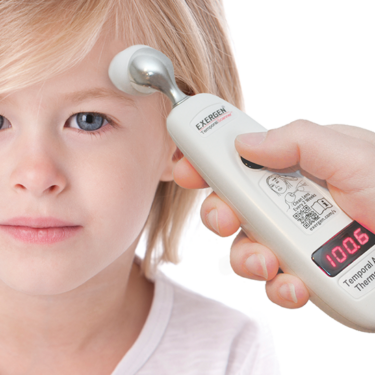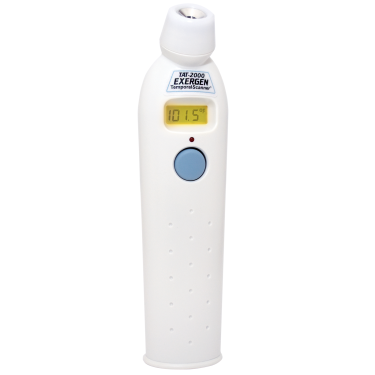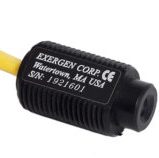When a child develops a fever, it can trigger immediate concern among parents. Is it dangerous? Should we rush to the doctor? What’s the best way to treat it? These questions are understandable, but many of the assumptions surrounding fevers are outdated or simply incorrect. According to the Cleveland Clinic, several myths continue to circulate among parents—despite clear evidence to the contrary.
Here are the facts you need to know about fevers in children, and why regular temperature monitoring with a reliable thermometer like the Exergen Temporal Artery Thermometer is a smart and practical step in managing your child’s health.
Myth 1: All Fevers Are Bad and Dangerous
One of the most persistent myths is that fevers are inherently harmful. In reality, a fever is the body’s natural defense against infection. It’s a sign that the immune system is active and responding. For most children, a mild to moderate fever (below 40°C or 104 F) is not dangerous and often resolves on its own.
Myth 2: A High Fever Means a Serious Illness
Parents often worry that the height of a fever indicates the severity of an illness. However, a child with a minor cold can run a high fever, while a child with a more serious condition might only have a slight temperature. The child’s behavior and other symptoms such as hydration, alertness, and responsiveness are more telling than the number alone.
Myth 3: Fevers Must Always Be Treated with Medication
Fever-reducing medications like acetaminophen or ibuprofen can help make a child more comfortable, but they’re not always necessary. If the child is eating, drinking, sleeping well, and staying alert, it may be best to simply monitor the fever and allow the body to heal naturally. Overmedicating or treating a fever too aggressively can sometimes interfere with the body’s immune response.
Myth 4: Fevers Can Cause Brain Damage
This is a common fear, but in otherwise healthy children, fevers caused by infections do not cause brain damage. Even febrile seizures while understandably frightening—are usually harmless and do not lead to long-term health issues. True fever-related brain damage only becomes a concern at extremely high temperatures (above 42,2°C or 108 F), which are extremely rare in routine illnesses.
Myth 5: If the Fever Doesn’t Go Down, the Medication Isn’t Working
It’s important to understand that medications don’t “cure” a fever, they only reduce it temporarily. The underlying cause of the fever, such as a virus, must still run its course. A fluctuating temperature, even after medication, is normal and not necessarily a cause for alarm.
Why Temperature Monitoring Matters
While most fevers are not dangerous, consistent and accurate temperature monitoring remains an essential part of fever management, especially in children under the age of 3, or those with underlying medical conditions. Knowing when a fever starts, how high it climbs, and how it changes over time helps caregivers and healthcare providers make informed decisions.
This is why checking your child’s temperature twice daily, especially during periods of illness, is recommended. A non-invasive, fast, and highly accurate device such as the Exergen Temporal Artery Thermometer can make this process easy and stress-free. Unlike traditional thermometers that may require oral, rectal, or tympanic (ear) readings, the Exergen thermometer gently scans the forehead by gently touching it and delivers a clinically accurate core body temperature in just seconds.
Its ease of use makes it suitable not only for home monitoring but also for use in pediatric clinics and hospitals around the world. In moments when every detail counts—such as distinguishing between a low-grade fever and a spike that may require medical attention—using a reliable thermometer like the Exergen Temporal Artery Thermometer can provide peace of mind and help guide appropriate action.
Fevers are often misunderstood, leading to unnecessary worry and potentially unhelpful responses. By separating myth from fact and focusing on practical, evidence-based care, parents can better support their children’s recovery. And in doing so, thermometers like the Exergen Temporal Artery Thermometer can play a key role in managing fever safely, efficiently, and confidently.
Source,
Exergen P/N: 850472
